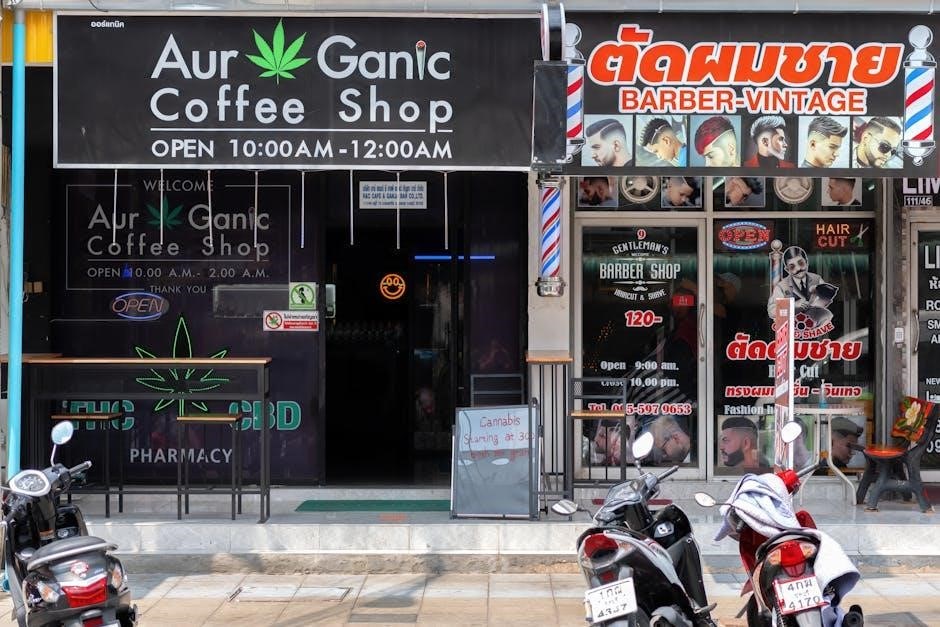Thai sexuality is shaped by a blend of traditional values and modern influences, reflecting a complex interplay of cultural, religious, and social norms in a rapidly changing society.
1.1 Cultural Attitudes Toward Sexuality in Thailand
Thai society exhibits a mix of traditional modesty and openness regarding sexuality, influenced by cultural and religious norms. Public discussions on sex are often reserved, especially in formal settings, reflecting a strict sense of social appropriateness. While men are allowed more freedom in expressing their sexuality, women are expected to maintain a reserved and demure demeanor to uphold societal respect.
1.2 Historical Context of Sexuality in Thai Society
Thai sexuality has deep roots in Buddhist teachings and traditional values, emphasizing modesty and restraint. Historical norms often restricted open discussions of sex, with women expected to maintain virginal purity. However, the influence of Western ideals and modernization has gradually shifted attitudes, blending conservative values with more liberal perspectives, particularly in urban areas, creating a unique cultural paradox.

Gender Roles and Sexual Expectations
Thai society often expects men to embrace dominant, assertive roles, while women are traditionally seen as submissive and reserved, influencing their sexual behavior and societal expectations.
2.1 Traditional Gender Roles in Thailand
In Thailand, traditional gender roles are deeply rooted in a patriarchal society, where men are often expected to be providers and women to manage domestic duties. This structure significantly influences sexual expectations, with men encouraged to embrace dominance while women are typically expected to remain modest and submissive in sexual relationships.
2.2 Societal Expectations for Men and Women
Societal expectations in Thailand reinforce traditional gender roles, with men often expected to be dominant and sexually assertive, while women are typically encouraged to be modest and reserved. Women are expected to maintain sexual demureness and virginity before marriage, reflecting a double standard that prioritizes male sexual freedom while restricting female sexual expression.

Religious and Cultural Influences on Sexuality
Religious and cultural influences in Thailand shape sexual norms, with Buddhism emphasizing moderation and moral behavior, while cultural practices often perpetuate traditional gender roles and sexual expectations.
3.1 Role of Buddhism in Shaping Sexual Norms
Buddhism plays a significant role in shaping sexual norms in Thailand, emphasizing moderation and moral behavior through the Middle Path. While homosexuality is not explicitly condemned, societal norms often suppress open expression, particularly for women. Religious teachings influence gender roles, promoting modesty and restraint, which impacts both male and female sexual behavior and expectations in Thai culture.
3.2 Impact of Religious Dogma on Sexual Health Practices
Religious dogma, particularly from Buddhism, influences sexual health practices in Thailand by promoting modesty and restraint. This often limits open discussions about sexuality, hindering comprehensive sexual education. While Buddhism does not explicitly condemn homosexuality, societal norms rooted in religious teachings can create barriers to accessing sexual health resources, especially for women and marginalized groups.
Legal and Social Perspectives on Sexuality
Thailand’s legal framework progressively addresses sexuality, with same-sex marriage legalized, marking a milestone in LGBTQ+ rights. Socially, acceptance varies, with urban areas more open to diverse sexual identities compared to rural regions, where traditional norms persist, influencing public attitudes toward sexuality and gender expression.
4;1 Legalization of Same-Sex Marriage in Thailand
Thailand made history by becoming the first Southeast Asian country to legalize same-sex marriage, marking a significant step forward in LGBTQ+ rights. This progressive legislation allows married same-sex couples to adopt children, reflecting a shift toward greater inclusivity and legal recognition of diverse relationships in Thai society.
4.2 Social Acceptance of LGBTQ+ Community
Thailand is known for its welcoming attitude toward the LGBTQ+ community, with a vibrant culture that openly embraces diverse identities. Despite legal advancements, societal acceptance varies, with urban areas being more progressive than rural regions. Buddhist teachings promote tolerance, and Thailand actively markets itself as an LGBTQ+-friendly tourist destination, fostering a relatively inclusive environment compared to many other Asian countries.
Sex Industry in Thailand
Thailand’s sex industry is a significant economic sector, driven by tourism and local demand, often linked to cultural attitudes that normalize commercial sex as a social phenomenon.
5.1 Economic Factors Driving the Sex Industry
The Thai sex industry thrives due to high demand from tourism and local patrons, with many women entering the trade to support families, reflecting economic disparities and limited job opportunities in rural areas. This economic reliance perpetuates the industry’s growth and normalization within Thai society.
5.2 Regional Variations in the Sex Industry
Thailand’s sex industry varies by region, with urban areas like Bangkok offering high-end entertainment, while rural areas see more localized, discreet operations. Coastal tourist spots cater to foreigners, blending commercial sex with entertainment, whereas northern regions often focus on domestic clientele, highlighting diverse economic and cultural drivers across the country.

Sexual Health and Education
Sexual health in Thailand is influenced by cultural and religious norms, with limited access to resources in rural areas and inadequate sexual education contributing to public health challenges.
6.1 Access to Sexual Health Resources
Access to sexual health resources in Thailand varies significantly by region. Urban areas often have better facilities and awareness campaigns, while rural regions face challenges due to limited healthcare infrastructure and cultural stigma, hindering access to contraception and STI treatment for many residents.
6.2 Sexual Education in Thai Schools
Sexual education in Thai schools is often limited and avoids explicit topics, focusing instead on abstinence and traditional values. While some urban schools incorporate modern approaches, rural areas lag behind, leaving many students with inadequate knowledge about contraception, consent, and STI prevention, reflecting broader societal attitudes toward sexuality and youth.
Cross-Cultural Relationships and Marriage
Thai cross-cultural relationships often involve emotional and economic exchanges, with women seeking stability and men desiring companionship, blending cultural norms and personal aspirations in unique ways.
7.1 Dynamics of Cross-Cultural Marriages in Thailand
Thai cross-cultural marriages often involve Thai women and foreign men, driven by economic needs and emotional connections. These unions reflect cultural exchanges but also face challenges like language barriers and societal expectations, requiring adaptation from both partners to navigate differences in values and lifestyles, ultimately shaping unique familial dynamics and cultural blending in modern Thailand.
7.2 Challenges Faced by Interracial Couples
Interracial couples in Thailand often face challenges such as cultural and social differences, language barriers, and economic pressures. Societal expectations and distinct lifestyles can create tension, requiring mutual understanding and adaptation to navigate these complexities successfully.

Male and Female Sexual Behavior
Male sexuality in Thailand is often openly expressed, while female sexuality remains reserved, reflecting societal norms that emphasize male dominance and female modesty.
8.1 Male Sexuality in Thai Culture
Male sexuality in Thailand is often openly expressed, with societal norms allowing men greater freedom in sexual behavior. Thai culture, influenced by Buddhist teachings, views male sexuality as natural, yet modesty is still expected; Men are traditionally seen as dominant, and their sexual desires are often accommodated, while women are expected to remain reserved. This reflects Thailand’s patriarchal society, where gender roles remain distinct.
8.2 Female Sexuality and Societal Restrictions
Female sexuality in Thailand is heavily influenced by traditional societal norms, emphasizing modesty and reserve. Women are expected to maintain sexual demureness, with virginity often seen as a virtue. Public discussions about female sexuality are limited, and women face pressure to conform to conservative gender roles, restricting their sexual autonomy and expression compared to men.
Gender Identity and Expression
Thailand exhibits a diverse array of gender identities and expressions, with cultural acceptance of non-traditional roles, reflecting a dynamic interplay between tradition and modernity in gender identity and expression.
9.1 Diversity of Gender Roles in Thailand
Thailand showcases a rich diversity in gender roles, extending beyond traditional male and female identities. The culture acknowledges non-traditional roles like kathoeys (ladyboys) and transgender individuals, reflecting a fluid understanding of gender. This diversity is more openly expressed in urban areas, while rural regions maintain stricter gender norms, highlighting the complex interplay between modernization and cultural traditions in shaping gender identity and expression.
9.2 Acceptance of Non-Traditional Gender Identities
Thailand has made strides in accepting non-traditional gender identities, particularly in urban areas, where diversity is more openly embraced. Despite this, societal acceptance varies, with rural regions often holding stricter views. Religious and cultural influences continue to shape perceptions, though progressive movements advocate for greater inclusivity and recognition of gender diversity, reflecting a gradual shift toward acceptance in modern Thai society.
Sexuality in Rural vs. Urban Areas
Urban areas in Thailand exhibit more progressive sexual attitudes, while rural regions often adhere to traditional values, reflecting a divide in societal expectations and cultural norms.
10.1 Differences in Sexual Attitudes Between Rural and Urban Populations
Urban populations in Thailand generally embrace more liberal sexual attitudes, influenced by globalization and education, while rural areas tend to maintain conservative views, shaped by tradition and religious values. This divide is evident in topics like premarital sex, LGBTQ+ acceptance, and gender roles, highlighting contrasting societal norms across different regions of the country.
10.2 Impact of Urbanization on Sexual Norms
Urbanization has led to shifting sexual norms in Thailand, with increased exposure to global cultures and education fostering more liberal attitudes. Young urban populations are more open to diverse sexual behaviors and gender roles, contrasting with rural areas where traditional values persist. This transformation is evident in changing perceptions of premarital sex, LGBTQ+ rights, and sexual health practices.
Sexuality and Humor in Thai Culture
Humor is a common way to discuss sexuality in Thailand, but with strict social boundaries. Jokes about sex are popular yet carefully tailored to avoid offending elders or women.
11.1 Role of Humor in Discussing Sexual Topics
Humor plays a significant role in Thai culture by making sexual topics more approachable. It allows individuals to address sensitive issues indirectly, reducing stigma and fostering open conversations in a socially acceptable manner while maintaining cultural decorum and respect for traditional values. This approach helps navigate the delicate balance between modernity and conservatism in Thai society.
11.2 Social Appropriateness of Sexual Jokes
In Thai culture, sexual humor is approached with caution, as societal norms emphasize respect and modesty, particularly in formal or mixed-gender settings. While sexual jokes may be accepted in more relaxed or tourist-friendly environments, they are generally avoided in polite conversation to maintain social harmony and avoid offending others.
Thailand’s sexuality reflects a dynamic blend of tradition and modernity, shaped by progressive laws, cultural influences, and shifting societal attitudes toward acceptance and inclusivity.
12.1 Summary of Thai Sexual Culture
Thai sexual culture embodies a paradox of traditional values and modern influences, blending Buddhist teachings with liberal attitudes. The sex industry thrives alongside conservative gender roles, while same-sex marriage legalization reflects progressive shifts. Urbanization fosters openness, yet rural areas cling to modesty, creating a cultural mosaic where sexuality remains deeply intertwined with societal norms and evolving identities.
12.2 Future Trends in Thai Sexuality
Future trends in Thai sexuality may include increased acceptance of LGBTQ+ rights, influenced by progressive legislation and urbanization. Improved sexual education and digital connectivity could foster openness. The sex industry might evolve with shifting societal attitudes, balancing economic realities with changing norms. These factors suggest a gradual liberalization while respecting cultural traditions.

Leave a Reply
You must be logged in to post a comment.